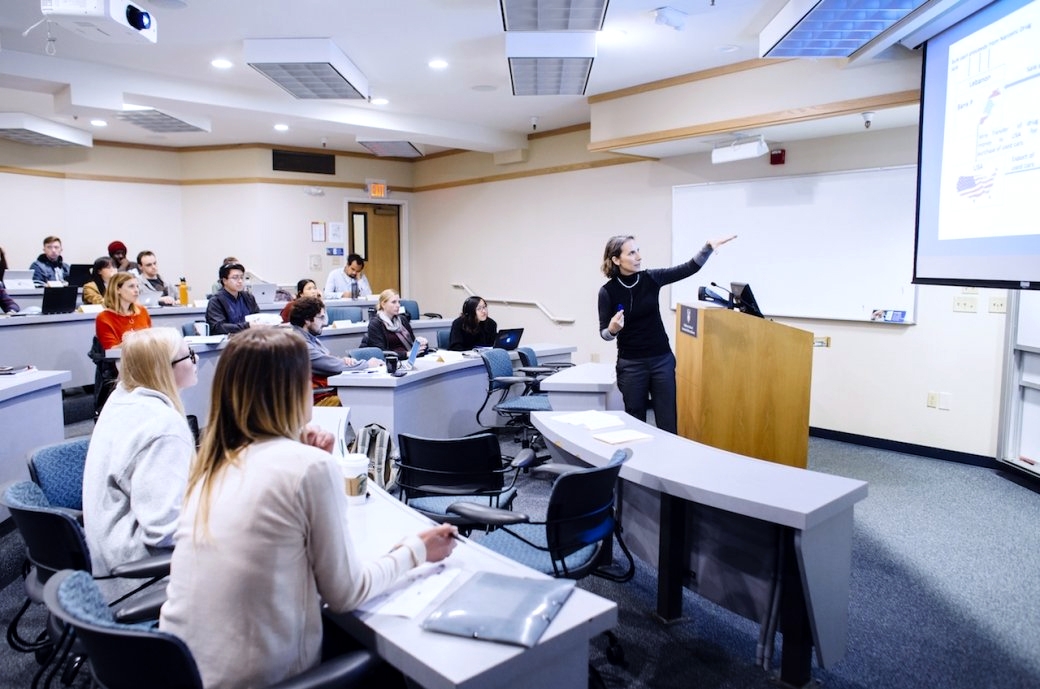A Conversation with Moyara Ruehsen

Professor Moyara Ruehsen has been teaching courses on financial crime—including money laundering, trade-based financial crime, corruption, proliferation financing, and terrorist financing—at the Institute since 1994. She also oversees the Institute’s Financial Crime Management program, which offers a specialization for master’s degree candidates as well as a stand-alone certificate for mid-career professionals.
Q. How did you become interested in financial crime as a topic for research and teaching?
A. After I received my doctorate, UC Berkeley invited me to apply to teach in their political economy program and asked what courses I could offer. I said I’d love to put together a course on illicit markets, and they offered to make me a visiting scholar so I could do that. My career took a pretty big turn right there, and I haven’t looked back. Initially I was looking at the political economy of international organized crime, examining sex trafficking, arms trafficking, and drug trafficking, but it was the money laundering piece that really captured my interest. It was the one common thread, and it seemed like the area of high vulnerability for these criminal groups, and therefore a logical target.”
Q. Last year the Institute formally established a specialization and certificate program in Financial Crime Management. How did that come about?
A. The specialization and certificate program came in reaction to a market need. The employment opportunities in the area of financial crime management and compliance have been expanding rapidly since 9/11 because of pressure on the private sector—particularly financial institutions—to do a better job of policing all the transactions they handle. Regulators ratcheted up the fines issued against financial institutions from tens of millions in the ’90s to hundreds of millions, and more recently billions.
As a result, financial institutions have been building up staffing in their compliance departments. They especially need investigators who can conduct investigations in foreign languages and who have curiosity and general knowledge on topics like geography, politics, and economics. They want an investigator who sees trade documentation that shows a shipment of electronics going from Vladivostok to Johannesburg to Kuala Lumpur to recognize that this doesn’t make geographic sense and dig deeper. Does the description of the shipment match its weight? Did the shipment originate not from Vladivostok but from North Korea? Why does another document say “Korea” and not “South Korea”? These are examples of the types of red flags we look for.
The specialization complements the Nonproliferation and Terrorism Studies degree curriculum by adding a critical piece to both counterterrorism studies and counterproliferation studies. One of the key ways you track and stop both WMD proliferation and terrorism is by following the money.
One of the key ways you track and stop both WMD proliferation and terrorism is by following the money.
Q. What sorts of jobs and career tracks do students who study financial crime management move into?
A. Students are going into both public-sector and private-sector jobs where they’re using these skills.
In the public sector, the Treasury Department’s Office of Foreign Assets Control manages our sanctions regime. This includes not just sanctions against North Korea and Iran, but also sanctions against thousands of individuals and business entities involved in terrorism, high-level drug trafficking, and WMD proliferation. The Financial Crimes Enforcement Network collects financial intelligence reports from financial institutions about suspicious activity, and the Terrorism and Financial Intelligence Unit watches out for evidence of terrorism and proliferation financing. We have had alumni working in all of these units, plus all of the three-letter agencies—the FBI, DEA, DIA, CIA, and DOJ—as well as the UN Office on Drugs and Crime.
Still, the majority of students in this area end up going into the private sector. Quite a few of the jobs are at large banks, but we’re starting to see more students go into the area of “fintech,” meaning mobile payment platforms like PayPal, Square, Stripe, and Ripple; these companies all need financial crime compliance professionals. They also find jobs with business threat intelligence companies like Kroll, Thompson Reuters, and Mintz Group, to which companies outsource the advanced due diligence they are now required to do on all their foreign partners.
Q. What’s the cleverest or most bizarre example of financial crime you’ve ever come across?
A. More and more criminal money is moving by way of falsely invoiced trade transactions, whether it’s $4,700 inflatable beach balls or real diamonds valued at $13 a carat. It’s clever because it’s hard to catch. The most bizarre? Large-denomination bills stuffed in the heels of shoes or in hollowed-out bananas, or the flight attendant who thought that wrapping large piles of cash in aluminum foil would “foil” airport screening machines.
For More Information
Jason Warburg
jwarburg@middlebury.edu
831-647-3516
Eva Gudbergsdottir
evag@middlebury.edu
831-647-6606
